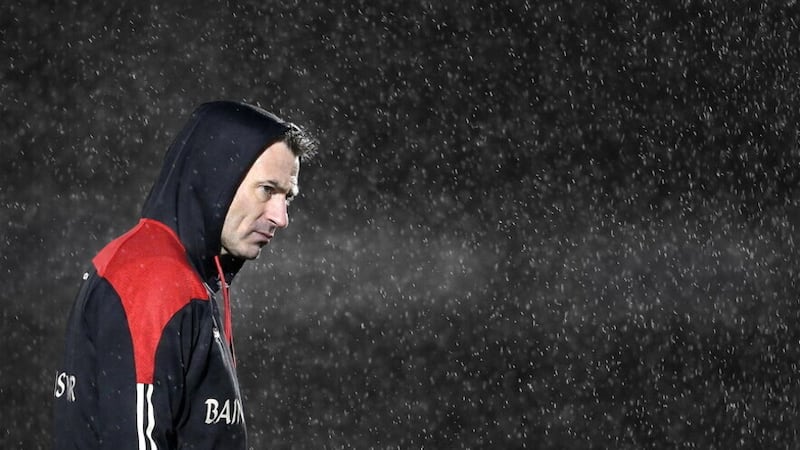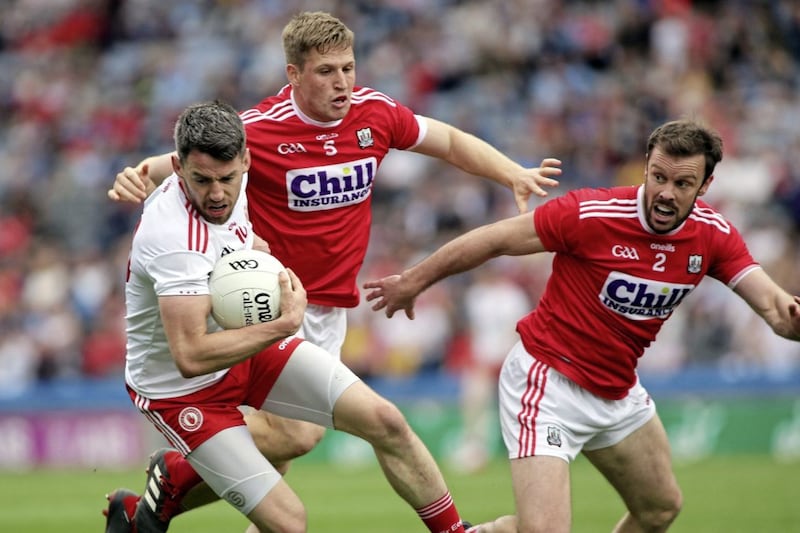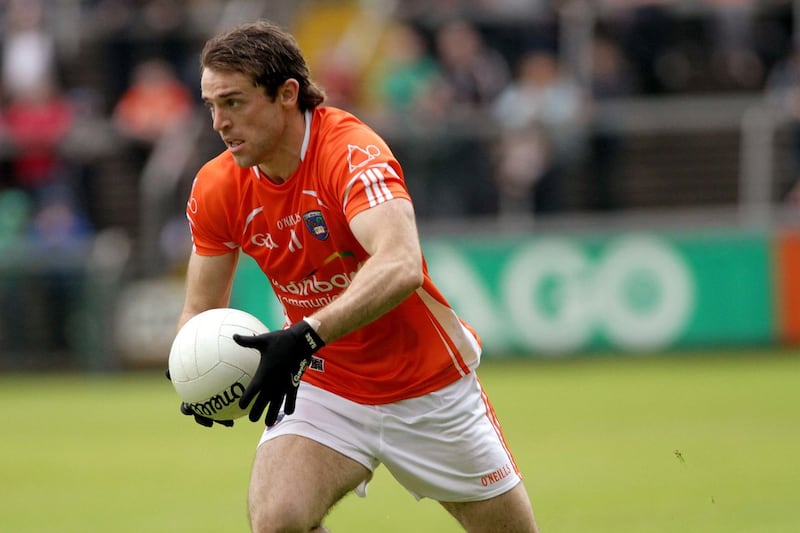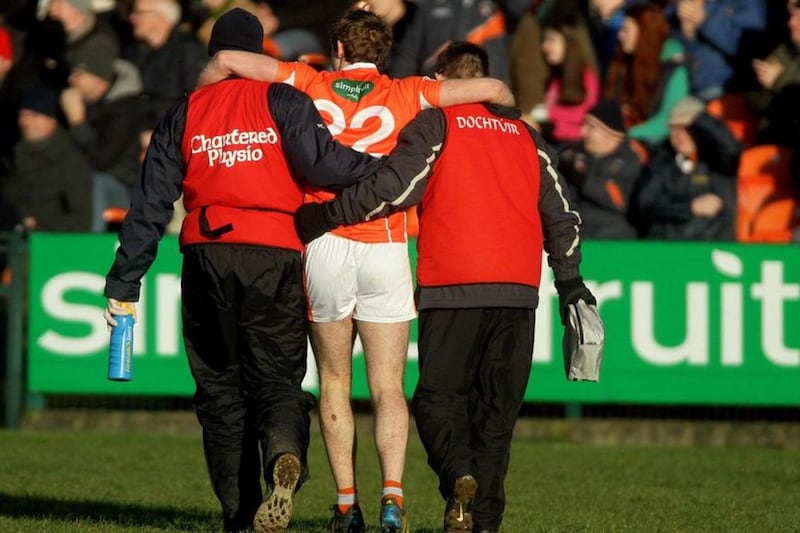GIVEN the amount of pain and frustration - not to mention the number of false dawns - that have blighted the injury-riddled last three years of his career, Kevin Dyas has had to accept a new reality.
Tomorrow, he will be happy to get any time on the field when Kilmacud Croke’s take on Portlaoise in the Leinster semi-final.
Dyas has played the sum total of 25 minutes across three games since the Dublin championship began in April – 13 as a late sub v Ballyboden, 10 against St Sylvester’s in the quarter-final and the final two of the last four victory over St Jude’s.
For a man who helped Armagh to an Ulster minor title way back in 2005 side, starred as Abbey CBS swept to MacRory and Hogan Cup success the following year and was identified as a top talent by Aussie Rules outfit Collingwood, this is not how he had envisaged his playing days panning out.
Just turned 31 last month, Dyas should be a central figure in this Kilmacud side alongside multiple All-Ireland winners Paul Mannion and Cian O’Sullivan, rather than being sprung from the bench in the dying embers.
But he’s not and, chances are, he never will be. It sounds cold, it sounds hard, but this is the reality Kevin Dyas has learned to live with.
“It’ll always be an ongoing thing for me.
“Where I’m at now, I’m fairly limited in terms of the training I can do. I can train maybe once during the week so I’m ready to go on the Saturday or Sunday, whether a training session or a match.
“After a train my knee gets sore and flares up, there’s fluid in it. It usually takes a few days for that to go down...”
As a result, the prospects of playing a full 60 minutes again, for now anyway, appear remote.
“At the minute, no – for two reasons.
“Number one is that the knee itself probably wouldn’t last that long. I’d definitely be good for a half, maybe 40 minutes, but anything more than that and my knee would start to get pretty sore and flare up.
“Number two is that, because I’m limited in my training and can’t really get on the field on a Thursday, or run in between, my fitness wouldn’t be what it used to be. So even if my knee was okay, I probably wouldn’t have it in my lungs to last a full game anyway.”
Hamstring and knee injuries have cropped up every now and again, ultimately spelling a premature end to his dreams of a professional career Down Under.
But the worst was to come in the summer of 2015 when Dyas had to have the lateral meniscus removed from his right knee.
With little progress made in the six months after that operation, Dyas was told retirement might be his only option. A complicated microfracture procedure was a final shot at prolonging his career, followed by an extensive, at times hugely frustrating, rehab programme.
Last April the Dromintee native made it back into an Armagh jersey for the first time in three years when introduced as a late sub in the Division Three final win over Fermanagh.
The surge of goodwill that came his way took him aback after what would turn out to be his farewell appearance for the county.
Physically, the struggle has been huge, at times appearing insurmountable. He takes some comfort from the fact he couldn’t possibly have given any more to try and get back to the player he once was.
Being faced with this new reality is one thing, accepting it is another entirely.
But sitting here on the eve of a huge game for the club he joined just months after that 2015 injury, he insists the mental scars have been healed.
There is no bitterness, no anger, just regret that it had to be this way.
“Initially it was very difficult.
“It was difficult in terms of the amount of effort and work you have to put in to be able to just get yourself on the bloody pitch – that’s extremely frustrating and challenging mentally.
“What I probably struggled with the most was basically just accepting that you’re not as good as you used to be, and you probably never will be. That your body just can’t really do the things that your head might tell it to do.
“Players always want to play, always want to start, always want to be the best they can be, so I suppose it’s a bit of a kick to your ego when you’re just not able to do what you used to be able to do.
“They’re probably the two most difficult parts of it mentally, but I’ve made peace with that. I’ve got over the fact it happened, I’ve been through those moments of feeling sorry for myself and getting a bit down, but thankfully that’s sort of behind me now.
“That’s why I’m really enjoying playing for Kilmacud at the minute, even if I am just coming off the bench.”
You can tell that uttering those words, knowing they are for public consumption, is not an easy task.
But it is perspective that has allowed Dyas to accept the place in which he finds himself, in particular knowing that he may not have kicked a ball again had initial diagnoses been correct.
“In the two or three years after it happened, I put in a serious amount of effort. Looking back, sometimes I wonder what I was thinking at the time, I was a bit of a lunatic trying to get back with some of the stuff I was doing.
“I guess now it’s given me a chance to still be able to play, so I’m grateful for being able to do a bit of hard work up front and hopefully I’ll be able to help Kilmacud in the next year or two.
“The club has been great to me since I joined. I literally joined them two months after my knee injury happened; I didn’t realise how bad it was at that time, so they got me at my absolute worst and, in fairness to them, they’ve been very supportive.
“Since I joined I’ve been more or less useless to them up until this year, but they understand the situation, they understand the injury and the hard work I’ve put in to try and get myself back.
“And when I’m able to train and able to play, I’ll give it everything I have.”
Based in rugby country on Dublin’s south side, Kilmacud has forged a fearsome reputation on the Gaelic football front through time.
The 2018 Dublin championship success was their eighth since breaking down the wall in 1992, while All-Ireland club titles from 1995 and 2009 take pride of place in the club trophy cabinet.
Coming from a rural club like Dromintee, Dyas admits he wasn’t sure what to expect after a new job at professional services firm PriceWaterhouseCoopers saw him relocate to Stillorgan.
What he found, though, was a club that shared many of the same values he knew from back home in south Armagh.
“That side of things is probably what has surprised me the most about Kilmacud. I was expecting it wouldn’t be as close-knit as a country club, I wasn’t expecting it to have that same sort of community vibe.
“But the players are extremely close and probably interact with the club and are around the club as much as the players would have been when I was in Dromintee.
“There’s a great buzz around the place and an expectation to try and go on.”

And where Cian O’Sullivan is the rock in defence, it is the scoring threat and all-round brilliance of Paul Mannion that played such a huge part in delivering a first Dublin championship in eight years.
Dyas put the 25-year-old right up there alongside anybody he has shared a field with, and hopes his rich vein of form can continue at Parnell Park tomorrow afternoon.
“I can’t really pick out any flaws in him to be honest. He used to make a few silly mistakes and had a slight frame, but he’s flawless at the minute. He’s got the whole lot.
“Paul is a man at the peak of his powers at the minute. His skill levels, his athleticism, he’s unbelievable, and equally as impressive in person.
“Cian is a completely different player to Paul but his communication, awareness and his tactical nous are second to none.
“Off the pitch they’re just really genuine guys, no notions about themselves – they’re just good fellas.”








